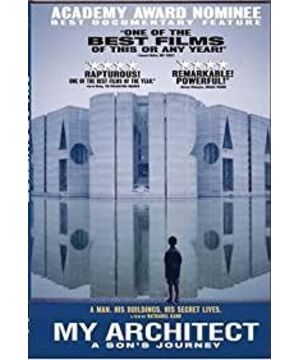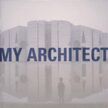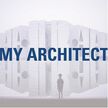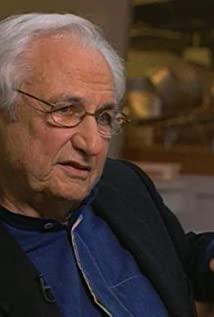In 1974, Louis Kang, who returned from India, suffered a heart attack and died at Penn Station in New York. More than twenty years later, his illegitimate son Nathaniel seeks out the people around Louis Kahn and the great buildings that have been completed, trying to understand his father.
Nathaniel, who is almost middle-aged, is not very smart. He always says some ordinary things. He doesn't have any incisive questions. It was a search and interview with questions and answers, a little bit of a running account, but Louis Kahn was really brilliant, and his architecture pointed to eternity. He is the kind of genius, full of thinking, dogmatic, everything outside of his works seems to be just a moderation of his emotions and desires. Louis Kahn alone makes a very poorly conceived documentary like Sands, always with shocking scenes Fragment flashes in it.
Born into a poor Jewish family, Louis Kahn could only paint with charcoal as a child. At the age of three, he was attracted by the fire in the hearth and took the coal out of it, causing severe burns, his father said. It would have been better if he died, but his mother said he would become a great man. Because of his scars, he was ridiculed countless times in school, and the countless suppressions that followed drove this short, ugly Jew with a broken voice to explore Inwardly, he has built a strong spiritual world. When facing adversity and difficulties, he never tries to escape or cover up, but highlights everything and then solves them one by one.
Louis Kang was a wanderer all his life. Born in Estonia in 1901, he moved to the United States with his parents at the age of five and moved seventeen times in the first two years. Even Kang was not his real surname, but Shmalowsky. All over the world, returning from the airport, working in the studio for two or three days, and then flying away in a hurry. He has three families and many friends, but he is always on the wandering way of work, thinking that work will always come first, and Don't rely too much on interpersonal relationships. In the end, he died lonely at the train station, which seemed to be the destined destination for such a wanderer.
He had three women and three families at the same time in his life. The addresses were within a few miles of each other. They met each other at his funeral, and the rest only knew each other vaguely. At the age of 28, he married Esther and stayed with him for the rest of his life. Te is more of an umbrella for the family, she knows he will be very rich if he wants to make money, but also understands that he sees money as nothing and has nothing in his life, just a little book and a tie to decorate.
Ann was attracted by his great charm, firm leadership, patient and easy-going with others. Perhaps she was the one who knew him best and was the one most influenced by him. She knew that she could not keep him, so she proposed Leave, though not really wanting to leave; understand that he crossed out the address on the document because he didn't want people to know he was dead; understand the best part of his building, and the regret of being a little unrecognizable afterward. He told her to Philosophically open, so she thinks in a philosophical way all her life, although it is useless, life always needs to do something. When asked if she will think of him, she will say, don't think of him, He was always there. Perhaps at their brightest moment, nothing could stop the great passion. The letter reads "My dear, I must make the greatest building of this era, and you must help me design it. This particular building, I'm not sure I can do it without you, think about how disappointing the building is now, we, you and I, let them see what a real building is."
Heliart seems to have failed to understand Louis Kahn. Their shared life is full of romance and hope, soothing those moments of loneliness and incompleteness, and rekindling courage in the face of setbacks and criticism. And she always seems to be so wronged , jealously wants to have Louis Kahn, humiliation and resentment weave her lonely life, make her miss him forever.
In architecture, he has mastered the control of materials. In class, he said to the students: "You said to the brick: 'Brick, what do you want to be?' The brick said to you: 'I love arch'. You said to the brick: 'Look, I want an arch too, but the arch is expensive. I can make a concrete lintel on top of you, above the opening.' Then you go on to say: 'Brick, what do you think?' Brick said: 'I love arches'." It's not hard to see that it's important that we respect the materials we use. "
Louis Kahn is serious to the point of paranoid in his work. Architecture has been his life since his youth. The existence of life is but an accident, in which countless things are changeable, and he has been looking for some kind of eternity, those modernist Reinforced concrete and glass mirrors were not enough until he was fifty years old when he toured European classical architecture, from those great ancient buildings, he finally found his style, maybe it can be said that he created modern buildings with the feeling of ancient ruins, but And far more than that. As he thinks about art: a work of art is a miracle of the fingertips, but also a miracle of the mind, conveying a sense of authenticity and excellence, presenting yourself with an emotion you already know; you understand it, look for it You have heard it, but you must listen to it again, of course you can't do it, but people can.
He never considers himself a prince, a refined person, he strives to be a participant and to be recognized by everyone. He does not compromise in all his work, he can call his colleagues at three in the morning, and he can insist on what he has. The idea of is not changed by the client, the same great architects Philip John, IM Pei, Gehry... all understand that his architecture is almost all art, and full of admiration, in another fifty years, even if the wood has already rotted Bad, the spirit in the building will also last long enough to beat time.
In those symmetrical and orderly geometry, he conveys the original power, which is infinitely close to God-like perfection. He uses a unique way to present matter in a spiritual way, focusing on the sense of nothingness, silence, and mysterious light. In the poorest country, Bengal, build great buildings, the outside is magnificent on the water, the interior space, the light, makes people cry. He is here, as long as you enter the silence, you will hear him sound.
View more about My Architect reviews









